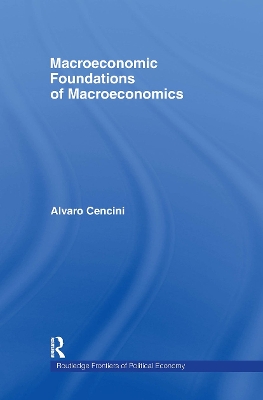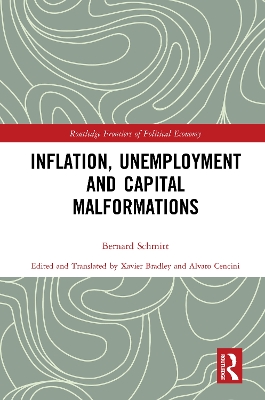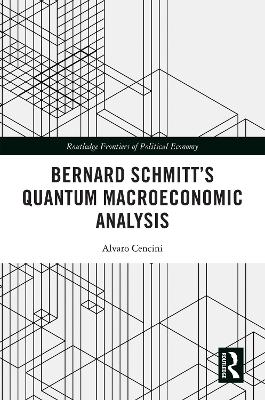Routledge Frontiers of Political Economy
3 total works
Contrary to common belief, macroeconomics is not merely a theory of aggregates, and cannot be constructed from individual behaviour. Both nationally and internationally, there are economic laws that are logically independent of economic agents’ behaviour. These are the macroeconomic foundations of macroeconomics.
Presenting cutting-edge material, Alvaro Cencini explores these foundations, and shows that the introduction of money entails economics being interpreted conceptually not mathematically. His innovative book provides the elements for a new approach by applying the most recent results of monetary analysis to the study of national and international economics. It covers recent progress in monetary theory, provides the reader with a greater understanding of the subject, and will be essential reading for economic students as well as a valuable resource for economists.
Inflation, Unemployment and Capital Malformations
by Bernard Schmitt, Xavier Bradley, and Alvaro Cencini
The volume deals with the main problems faced by capitalist economies, inflation and unemployment, in a new and original way, and provides the theoretical foundations for quantum macroeconomic analysis. Its aim is to allow English-speaking economists and interested readers to have a direct access to the analysis provided by Schmitt in his 1984 book Inflation, chômage et malformations du capital.
Orthodox economics has failed to provide a consistent insight of the pathologies hindering our economies, and both the academic and the economic worlds are much in need for an alternative approach capable to explain the origins of these pathologies and how they can eventually be disposed of. Schmitt’s volume provides a revolutionary explanation of the cause of today’s economic disorder as well as an innovative solution allowing for the passage from disorder to order. Neoclassical and Keynesian theories of any type are essentially based on equilibrium analysis and this is why none of them has ever been able to provide a consistent macroeconomic analysis based on macroeconomic foundations. This is what Schmitt’s book aims for: developing a new analysis built on identities rather than conditions of equilibrium, capable to explain the objective origins of inflation and unemployment.
In this volume, Schmitt introduces a new, revolutionary analysis centred on the concept of quantum time. The topics analysed by Schmitt cover the entire field of national macroeconomics, from production to capital accumulation, the leading role in this ground-breaking investigation being played by what he calls the theory of emissions. The ensuing macroeconomic theory is built on a set of laws derived from the monetary nature of our economic systems and defines the logical framework of inquiry into modern macroeconomics.
The aim of Bernard Schmitt’s analysis of the monetary economy of production was twofold: to introduce and to explain the logical character of the macroeconomic laws governing our economies and to explain the origin of the pathologies that follow if these laws are not complied with. Schmitt’s main original contributions concern the theories of value, profit, and capital, as well as his explanation of inflation, unemployment and international payments, unified as quantum macroeconomic analysis. This book expounds on the key principles of quantum macroeconomic analysis as he conceived and developed them.
Schmitt’s starting point was the analysis of bank money and the way it is associated with produced output. His macroeconomics was not founded on microeconomics nor derived from the aggregation of microeconomic variables. Schmitt’s theory does not rely on mathematics and modelling either; instead, it is based on logical laws derived from the nature of money and monetary payments. Part I of this book deals with the quantum macroeconomic analysis of capitalism and its pathologies developed by Schmitt and provides the elements necessary to understand its ‘structural’ mechanism. Parts II and III deal with the principles of two reforms that enable the passage from capitalism to post-capitalism and from the present non-system of international payments to an orderly system.
This book provides essential reading for all those interested in heterodox approaches to macroeconomics, monetary economics, banking, international economics, and the history of economic thought.


